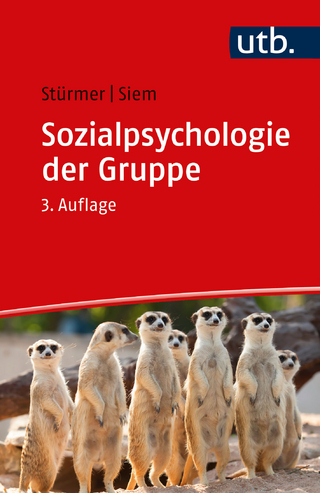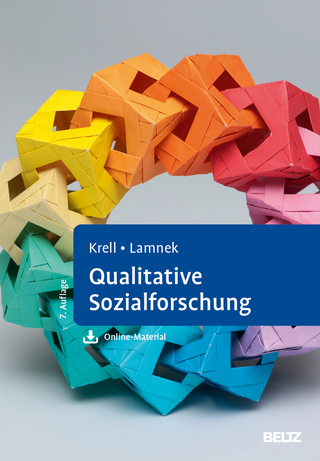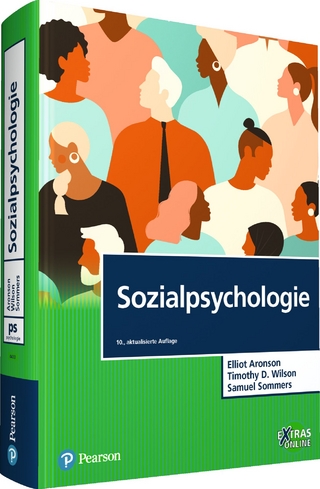
Applying Social Psychology
SAGE Publications Inc (Verlag)
978-1-4129-0282-3 (ISBN)
- Titel erscheint in neuer Auflage
- Artikel merken
`This is a highly readable book dealing with an exciting topic, applied social psychology, which is at the heart of many urgent problems of the new millennium. It is well suited for curing the disease of those who still believe there is an opposition between fundamental and applied research, between theories and practice. The major asset of this volume lies in the originality and strength of the PATH concept -- from problem definition, over analysis, and test, to helping. I like the idea to implement and institutionalize this framework in teaching and in education′ - Klaus Fiedler, University of Heidelberg
Introducing a new methodological approach for doing applied psychology, the PATH model, this book offers a simple, systematic, step-by-step, easy-to-use methodology for applying primarily social psychological theory to a wide range of social problems, from tackling crime and prejudice to fostering environmental conservation and team performance.
It helps and guides students to define a problem, conduct a theory-based analysis, develop an explanatory model, set up and execute a research project to test the model, and develop an intervention.
Applying Social Psychology is a highly practical text, which can be used by introductory and advanced level students who want to learn how to analyze practical problems and develop solutions for these problems based upon social psychological theory and research.
Written in an engaging and accessible way, this book offers:
1.A new methodological model put forward by the authors (PATH model);
2.Real world case studies;
3.End of chapter exercises;
4.Interviews with leading social psychologists;
5.Glossary of key theories and concepts in social psychology;
6.Recommended further reading.
Abraham (Bram) P. Buunk has been an Academy Professor in Evolutionary Social Psychology at the University of Groningen, on behalf of the Royal Netherlands Academy of Arts and Sciences (KNAW), since 2005. His main current interest is the application of evolutionary theorizing to human social behaviour. He has published over 6500 articles and chapters on a large variety of topics, on applied topics, including professional burnout, jealousy, absenteeism, AIDS-prevention, loneliness, depression, marital satisfaction, well-being among the elderly, interpersonal violence, psychological effects of oral contraception, and coping with cancer. He wais co-editor of Health, coping and well-being: Perspectives from social comparison theory (Lawrence Erlbaum Associates, 1997), and Applied Social Psychology (Cambridge University Press, 201708). He has served, among others, on scientific boards for the Dutch Cancer Foundation (NKB-KWF) and the Dutch AIDS Foundation. He was a member of the Programme Committee on Evolution and Behaviour of the Netherlands Organization for Scientific Research (NWO). Currently AbrahamBram Buunk is conducting research particularly in Latin America on various applied psychology themes, including domestic violence, and mate choice, from an evolutionary perspective. He is Visiting Professor at the Universidad Católica in Montevideo, Uruguay, and Associate Researcher at the Netherlands Interdisciplinary Demographic Institute. He received in 2012 the distinction of Honorary Professor at the Universidad Catolica de Santa Maria (Arequipa, Peru). Mark van Vugt is Professor of Evolutionary, Work and Organizational Psychology at Vrije Universiteit Amsterdam, the Netherlands, and director of the Amsterdam Leadership Lab. He holds an honorary position at the University of Oxford. Mark started his academic studies in Psychology in the Netherlands and worked at various universities in the UK, before returning to his birth country to take on a professorship in Psychology. He has published over 200 articles in major outlets such as Nature, Psychological Science, Psychological Bulletin, American Psychologist and The Leadership Quarterly on various fundamental and applied themes in evolutionary, social, and organizational psychology, including leadership and organizational behavior, altruism and cooperation, social identity and intergroup conflict, sex differences, environmental sustainability, water conservation and transportation. He is former Associate Editor of the Journal of Personality and Social Psychology and current Senior Editor of The Leadership Quarterly. He is author and co-author of several popular science books such as “Naturally Selected,” “Mismatch,” and his latest “Lucy, Darwin and Lady Gaga.” Mark is a Fellow of the Royal Academy for Arts and Commerce (UK) and Fellow of the Holland Society of Sciences (KHMW). He writes columns and blogs for various national and international media outlets about applied psychology.
Applying Social Psychology
The Problem Phase
From A Problem to A Problem Definition
The Analysis Phase
Finding Theory-Based Explanations for Problems
The Test Phase
Developing and Testing the Process Model
The Help Phase
Developing the Intervention
| Erscheint lt. Verlag | 20.11.2007 |
|---|---|
| Reihe/Serie | SAGE Social Psychology Program |
| Verlagsort | Thousand Oaks |
| Sprache | englisch |
| Maße | 170 x 242 mm |
| Gewicht | 480 g |
| Themenwelt | Geisteswissenschaften ► Psychologie ► Sozialpsychologie |
| ISBN-10 | 1-4129-0282-7 / 1412902827 |
| ISBN-13 | 978-1-4129-0282-3 / 9781412902823 |
| Zustand | Neuware |
| Haben Sie eine Frage zum Produkt? |
aus dem Bereich



